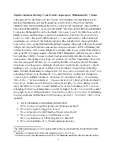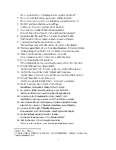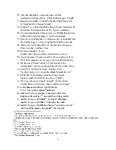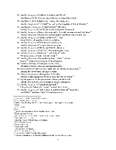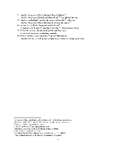Discourses of Muslim Scholars in Colonial Ghana
by John Hanson and Muhammad al-Munir Gibrill
Muḥammad b. 'Uthmān (elegiac poem)
Creator: al-ḥājj 'Umar ibn Abī Bakri of Kete-Krachi
Description: This elegiac poem is composed by al-ḥājj 'Umar Krachi (al-ḥājj 'Umar ibn Abī Bakr) on the death of Muḥammad b. 'Uthmān.
Muḥammad b. 'Uthmān was a leading Muslim scholar of the Mande-speaking Wangara diaspora. Al-ḥājj 'Umar Krachi was connected to him through a close relationship with his son, Ṣāliḥ b. Muḥammad, a leading Sufi scholar in West Africa (see Paul Marty, Etudes sur L'Islam en Cote d'Ivoire, Paris: Leroux, 1922, page 224; and Muhmmad Akbar, "Dyula Intellectualism in the Ivory Coast and Ghana: A Study of the Life and Career of al-ḥajj Ṣaliḥ b. Muḥammad b. 'Uthmān," University of Edingburg, 1974).
The poem begins with the classical motifs of the Arabic qaṣīda. The poem expresses the deep sorrow from learning of the death of this scholar and overwhelms the poet to make him wonder about his grief: were his tear drops from rain, waters from flowing rivers, or were they caused by nostalgia from missing his loved ones? It is an apt prelude as the scene portrays the psychological confusion created in the poet by the sad news. The poem then enumerates the outstanding achievements of the scholar in acquiring full command over all the Islamic sciences, both familiar and esoteric. The remainder of the poem is confined to prayers to God by the grace of prophets, messengers, pious men and women, companions of the prophet Muḥammad, his wives and other pious women. The poem ends with a prayer that God shows favor to the deceased and facilitates his transition in the other world and finally admits him in the blessed abode of the pious men of God.
Muḥammad b. 'Uthmān was a leading Muslim scholar of the Mande-speaking Wangara diaspora. Al-ḥājj 'Umar Krachi was connected to him through a close relationship with his son, Ṣāliḥ b. Muḥammad, a leading Sufi scholar in West Africa (see Paul Marty, Etudes sur L'Islam en Cote d'Ivoire, Paris: Leroux, 1922, page 224; and Muhmmad Akbar, "Dyula Intellectualism in the Ivory Coast and Ghana: A Study of the Life and Career of al-ḥajj Ṣaliḥ b. Muḥammad b. 'Uthmān," University of Edingburg, 1974).
The poem begins with the classical motifs of the Arabic qaṣīda. The poem expresses the deep sorrow from learning of the death of this scholar and overwhelms the poet to make him wonder about his grief: were his tear drops from rain, waters from flowing rivers, or were they caused by nostalgia from missing his loved ones? It is an apt prelude as the scene portrays the psychological confusion created in the poet by the sad news. The poem then enumerates the outstanding achievements of the scholar in acquiring full command over all the Islamic sciences, both familiar and esoteric. The remainder of the poem is confined to prayers to God by the grace of prophets, messengers, pious men and women, companions of the prophet Muḥammad, his wives and other pious women. The poem ends with a prayer that God shows favor to the deceased and facilitates his transition in the other world and finally admits him in the blessed abode of the pious men of God.
Date: 1895
Date Range: 1890-1899
Location: Kete-Krachi, Volta Region, Ghana
Format: Text/jpeg
Language: Arabic
Rights Management: Educational use only, no other permissions
Contributing Institution: Muhammad al-Munir Gibrill; John H. Hanson; Institute of African Studies, University of Ghana at Legon; Northwestern University; MATRIX: The Center for Humane Arts, Letters & Social Sciences Online at Michigan State University
Contributor: Muhammad al-Munir Gibrill (translator and transcriber); John H. Hanson (reviewer)
Digitizer: MATRIX
Archive: University of Ghana at Legon, Institute of African Studies
Source:
University of Ghana at Legon, Institute of African Studies, Arabic collection, document number 76.
